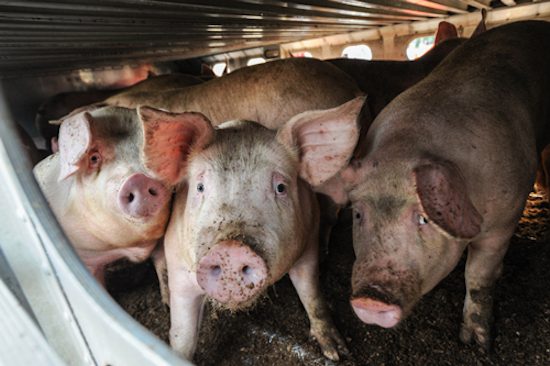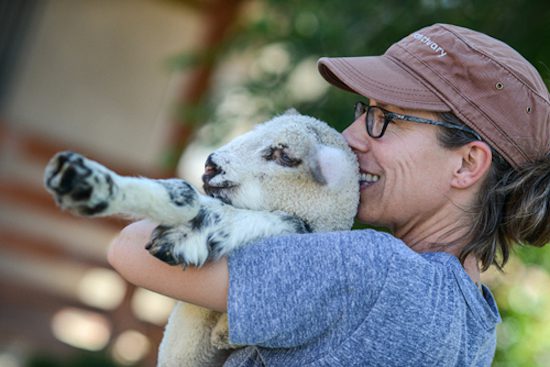


By Reynard Loki, Independent Media Institute
7 min read
The facts are clear and they are shocking: Factory farming is unhealthy for consumers, dangerous for workers, and devastating for the environment, and it is the largest cause of animal cruelty in the history of mankind.
In the United States alone, nearly 10 billion land animals are raised on factory farms and killed in slaughterhouses every single year, accounting for 99 percent of farmed animals in the nation. These animals are subjected to physical, psychological and emotional cruelty on a constant basis, living in extreme confinement where they experience fear and pain daily until they are killed for their meat. The normal lifespan of a chicken is five to eight years. But on a factory farm, they live just 47 days before they are sent to slaughter.
In addition to being the main cause of animal cruelty in the world, factory farming is a primary source of environmental degradation. The industrialized meat industry accounts for 37 percent of worldwide emissions of methane, a global warming gas 84 times more potent than carbon dioxide in the first two decades after its release. It is also responsible for 65 percent of human-made emissions of nitrous oxide—a gas 300 times more potent than carbon dioxide—that depletes the ozone layer, which protects the Earth’s surface from the Sun’s harmful ultraviolet radiation.
Factory farming also depletes the planet’s fresh water. Just a single egg takes more than 50 gallons of water to produce. A pound of chicken, 468 gallons. A gallon of milk, 880 gallons. A pound of beef, 1,800 gallons. It also requires vast tracts of land, which means the industrial meat industry is also the cause of massive deforestation around the globe, destroying ecosystems, threatening Indigenous communities and their traditional ways of life, and endangering a host of wildlife. Data shows that companies in the supply chain of JBS, the world’s largest supplier of meat, are potentially responsible for the destruction of up to 124 square miles of Brazilian rainforest every single year to produce beef that is exported around the globe.
It won’t be easy to transform the world’s food systems from animal to plants, but as Richard Trethowan, the director of the IA Watson Research Center at the University of Sydney’s Narrabri Plant Breeding Institute, writes in the Conversation, we can feed the human population with plant protein—without increasing the amount of farmland: “governments around the world must turn away from heavily [subsidized] but protein-poor cereals, and aggressively pursue legume production.”
Earth | Food | Life (EFL) contributor Josephine Morris, an expert in food policy and animal welfare with the Humane Society of the United States, works with the largest food companies, from fast-food chains like McDonald’s to foodservice firms like Sodexo, to uphold their commitments to improving the lives of animals in their supply chains. Last month, she wrote about the Food Industry Scorecard, a survey of 95 companies that looked at the progress being made (or not made) in terms of their stated public promises on increasing animal welfare.
“We’ve found that some of them are trying diligently to improve the lives of animals used in their supply chain; others are lagging behind or have backtracked from their pledges altogether,” she writes on NationofChange. “Sodexo is more than 60 percent compliant toward its goal of using only cage-free eggs and is actively working to increase its percentage of plant-based entrees,” Morris reports. “On the other hand, Marriott (and other companies) have repeatedly failed to keep their animal welfare promises, and Subway reports no progress made toward its 2012 promise to ‘rapidly eliminate’ cruel gestation crates from its pork supply.”
The coronavirus pandemic has laid bare the harsh realities of factory farming, as EFL contributor Linda Tyler, a fellow at Sentient Media who covers animal welfare issues, recently reported on Citizen Truth. “The COVID-19 crisis has played havoc with factory farming’s relentless raise-and-kill operations,” she writes. “Thousands of meatpacking and processing workers have been infected with the coronavirus, leading to the closing down of dozens of slaughterhouses. The animals destined for those slaughterhouses have had nowhere to go, and farmers have killed millions of animals, often in crude and cruel ways, including shooting, suffocation, and even heating the animals to death. Grown animals, as well as born and unborn baby animals, have been slaughtered. Farmers are ill-prepared to carry out this gruesome task, and animals are suffering horribly as a result.”
In addition to being exposed to coronavirus, factory farm workers—often undocumented immigrants—are routinely exploited by factory farm owners as a source of cheap labor and are forced to deal with dangerous working conditions: There is a 50 percent chance that a factory farm worker will be injured on the job. No wonder that U.S. factory farms, despite employing more than 500,000 workers, have one of the largest turnover rates in the nation: up to 100 percent annually.
What can be done? Well, the information gathered in the Food Industry Scorecard can help consumers make decisions about which companies they want to support, and which companies they want to avoid. It can also help shareholders decide where they want to invest and—if they’ve already invested in companies that have failed on their animal welfare commitments—where they might want to apply pressure. “Shareholders owning at least $2,000 worth of stock for at least one year can introduce a resolution,” writes Cameron Harsh, who manages the “Raise Pigs Right” campaign at World Animal Protection, a nonprofit. “In some cases, the submission of a resolution alone can lead to action by the company to address the issue of concern without requiring a full vote. It is in the interest of the company to avoid a public vote, and it can project a progressive image to shareholders ahead of the annual meeting.”
But the best thing we can all do is to reduce—or better yet, eliminate—our meat intake. For each person who chooses to switch to a meat-free diet, an estimated 100 animals per year could be spared a terrible fate. In addition to leaving animal cruelty and the environmental destruction caused by the meat industry off their plates, eaters who move to plant-based diets can experience a wide array of health benefits. Rich in fruits, vegetables, whole grains and legumes, plant-based diets are full of fiber, packed with vitamins and minerals, low in calories and saturated fat, and cholesterol-free. That translates to better health on multiple fronts: It can reduce the risk of heart disease, type 2 diabetes, certain types of cancer, and other major illnesses, including Alzheimer’s disease and other cognitive conditions. Many people who have transitioned to a plant-based diet “report bigger fitness payoffs, more energy, reduced inflammation, and better health outcomes after making the switch,” reportsForks Over Knives.
Some lawmakers are taking action. Senators Cory Booker (D-NJ) and Elizabeth Warren (D-Mass.) joined forces to advance federal legislation that would ban large-scale factory farming in the United States over the next two decades. The Farm System Reform Act seeks to place a moratorium on large-scale factory farming. It would also strengthen the Packers and Stockyards Act of 1921 to require country of origin labeling on beef, pork and dairy products. Rep. Ro Khanna (D-CA) is also co-sponsoring the effort, introducing companion legislation to the House of Representatives.
“Our food system was not broken by the pandemic and it was not broken by independent family farmers. It was broken by large, multinational corporations like Tyson, Smithfield, and JBS that, because of their buying power and size, have undue influence over the marketplace and over public policy,” Booker said. “That undue influence was on full display with President Trump’s recent executive order prioritizing meatpacker profits over the health and safety of workers.”
In June, Care2 launched a public petition—already signed by more than 131,000 people—to give Americans a chance to lodge their support of the Farm System Reform Act. In addition to signing this petition, you can contact your senators and representative to urge them to co-sponsor these bills. Animals trapped in our broken, inhumane food system don’t have a voice. So it’s up to all of us to speak on their behalf. Together, we can move the country to a healthier, more humane future. As Gandhi—who espoused a total commitment to nonviolence—wisely observed, “The greatness of a nation and its moral progress can be judged by the way its animals are treated.”
- Sign the petition to support Cory Booker and Elizabeth Warren’s bill to ban factory farming in the United States by 2040.
Cause for concern…

- Vegan activist targeted by death threats (Robyn Wuth, Forbes Advocate)
- Sioux City pork plant cited by regulators for inhumane slaughter (Nick Hytrek, Sioux City Journal)
- Horrifying secret footage shows factory farm workers abusing young sheep at Spanish slaughterhouse (Charlotte Mitchell, Daily Mail)
- Delhi: Farm animals being slaughtered in violation of laws (Shivam Patel, The Indian Express)
- Livestock transport must end: Ship carrying 5,800 cows from New Zealand to China sinks (Maritime Executive)
Round of applause…

- Moby discusses his new documentary “Takeout,” which shows how meat is killing the rainforests (LIVEKINDLY)
- The green movement: The push for a plant-based diet is getting bigger worldwide (Vaishali Dar, Financial Express)
- Polish parliament votes to ban $1.8 billion industry of kosher and halal meat for export (Cnaan Liphshiz, Jewish Telegraphic Agency)
- The vegan cookbook that’s also a call to action (Arati Menon, Food52 via MSN)
- Vegan tuna is the latest addition to the world of plant-based dining(Prestige)
Parting thought…

“Our relationship to most living things is and must be, I think, a moral one, not a practical one.” —Carl Safina
Earth | Food | Life (EFL) explores the critical and often interconnected issues facing the climate/environment, food/agriculture and nature/animal rights, and champions action; specifically, how responsible citizens, voters and consumers can help put society on an ethical path of sustainability that respects the rights of all species who call this planet home. EFL emphasizes the idea that everything is connected, so every decision matters.
Click here to support the work of EFL and the Independent Media Institute.
Questions, comments, suggestions, submissions? Contact EFL editor Reynard Loki at [email protected]. Follow EFL on Twitter @EarthFoodLife.